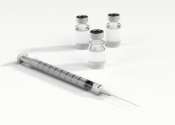Last update:
HIV & AIDS news
HIV & AIDS
'Undetectable' HIV patients could hold key to treatments
A rare group of HIV-positive people who maintain undetectable levels of the virus in their blood without medication could hold the key to new therapies for others living with the disease, says a leading genome expert.
Sep 27, 2024
0
0
HIV & AIDS
Most at-risk populations for HIV discussing the topic in negative, risky ways get the most social media attention
As the old saying goes, bad news travels fast. Research shows that saying holds true when it comes to young men discussing HIV on social media. An analysis of viral tweets from young men and adolescents, the most at-risk ...
Sep 25, 2024
0
0
Half of Black gay men will be diagnosed with HIV, despite highly effective preventive treatments—why?
At a pharmacy in Iowa, a 42-year-old Black gay man couldn't find a medication he needed. The pharmacist, a white woman, told him they didn't stock that medication. But while he waited to pay for his other purchases, he saw ...
Sep 23, 2024
1
1

Researchers determine a two-dose schedule could make HIV vaccines more effective
One major reason why it has been difficult to develop an effective HIV vaccine is that the virus mutates very rapidly, allowing it to evade the antibody response generated by vaccines.
Sep 20, 2024
0
94

S.Africa's HIV research power couple says fight goes on
Through decades of pioneering work on fighting the spread of infectious diseases such as HIV, South African public health power couple Quarraisha and Salim Abdool Karim are credited with saving thousands of lives.
Sep 19, 2024
1
0

Team demonstrates unprecedented control of SIV replication with immune-based approach
Emory researchers are the first to show unprecedented control of SIV replication and decay of viral reservoirs by combining a stringent model of infection with the interruption of antiretroviral therapy (ART). The success ...
Sep 17, 2024
0
38

New study increases understanding of HIV drug's negative effects on the brain
Efavirenz is an important drug for treating HIV infection, but it has negative effects that can significantly impact patients' quality of life over time. It causes neuropsychiatric disorders and neurocognitive impairment ...
Sep 17, 2024
0
0

Limited progress on QoL goals reported for persons with HIV aged 50 years and older
For persons diagnosed with HIV (PWH) aged 50 years and older, progress on quality of life (QoL) goals is limited, according to a study published online Sept. 12 in Morbidity and Mortality Weekly Report.
Sep 14, 2024
0
0

Twice-yearly injection cuts HIV risk by 96%, but will cost cut access?
It could be a real breakthrough for people at risk for HIV infection: A shot given every six months that reduces their risk by a whopping 96%.
Sep 13, 2024
0
0

Triple antibody therapy shows promise for long-lasting HIV control
In a study of 12 participants, researchers at Beth Israel Deaconess Medical Center (BIDMC) have demonstrated that a cocktail of three broadly neutralizing antibodies (bNAb) successfully suppressed virus in people living with ...
Sep 12, 2024
0
17

Diabetes drug helps the immune system recognize reservoirs of HIV, study discovers
Metformin, a drug used to treat type 2 diabetes, could help deplete the viral reservoir and eliminate it entirely in people living with HIV who receive antiretroviral therapy, Canadian researchers say in a new study.
Sep 10, 2024
0
42

Study: First sustained remission of HIV infection following a bone marrow transplant in absence of protective mutation
A total of seven individuals worldwide (two patients in Berlin and patients in London, Düsseldorf, New York, City of Hope and Geneva) are considered likely to have been cured or to be in long-term remission of HIV infection ...
Sep 5, 2024
0
2

How HIV/AIDS got its name
The Centers for Disease Control and Prevention first used the term "AIDS" on Sept. 24, 1982, more than a year after the first cases appeared in medical records. Those early years of the crisis were marked by a great deal ...
Sep 4, 2024
0
1

New study reveals relationship between HIV risk factors for LGBTQ+ youth
A new study has uncovered empirical evidence that shows what researchers have long suspected about HIV risk—that having multiple risk factors is much worse than having only one.
Sep 3, 2024
0
0

Childhood HIV vaccination strategy shows promise in study
Research at Weill Cornell Medicine suggests that childhood immunization against HIV could one day provide protection before the risk of contracting this potentially fatal infection dramatically increases in adolescence.
Sep 2, 2024
0
19

More than half of HIV-positive Americans are over 50: Figuring out care is complex
In the late 1980s, Linda Rose Frank began working with HIV-positive individuals at the University of Pittsburgh. At the time, those affected were mainly young men with a terrifying prognosis.
Sep 2, 2024
0
0

In South Africa's richest area, mother-to-baby HIV transmission is a concern despite free prevention
It's a worrying question for health officials in one of the richest and most developed areas of the African continent: Why are babies being born with HIV when free medication is available to prevent mother-to-child transmission?
Aug 31, 2024
0
0

Federal judge rules that US military cannot reject HIV-positive enlistees
People with HIV can no longer be turned away if they try to enlist in the U.S. military, a federal judge has ruled.
Aug 23, 2024
0
1

Cautious optimism in San Francisco as new cases of HIV in Latinos decrease
For years, Latinos represented the biggest share of new HIV cases in this city, but testing data suggests the tide may be turning.
Aug 22, 2024
0
0

Gauging attitudes toward a potential HIV vaccine in COVID-19's wake
A study by researchers from the CUNY Institute for Implementation Science in Population Health (ISPH) at CUNY SPH, published in the journal AIDS and Behavior, found that gay and bisexual men reported a general willingness ...
Aug 19, 2024
0
1

Current HIV prevention medication users often stigmatize other PrEP users as 'promiscuous'
Public health messaging that drives stigma around pre-exposure prophylaxis (PrEP), a medication that can reduce HIV risk by up to 99%, appears to play a role in uptake of the medication. While the potential mismarketing of ...
Aug 19, 2024
0
5

Antiretroviral therapies impact gut microbiome in people living with HIV, study finds
A study published in Scientific Reports by researchers at Karolinska Institutet reveals that different antiretroviral therapies (ART) influence the gut and oral microbiome, as well as body mass index (BMI), in people living ...
Aug 16, 2024
0
0

Hispanic women are less likely to get PrEP treatment—new intervention could change that
In the U.S., Hispanic women have been disproportionately affected by the HIV epidemic in recent years. Yet they've been less likely to take advantage of PrEP, a medication that significantly reduces the risk of getting HIV.
Aug 15, 2024
0
0

Ugandan women's autonomy key to safer sex, researchers say
Ugandan women's ability to negotiate the conditions and timing of sex, such as refusing sex and asking for condom use with their partners, is key to preventing several reproductive health outcomes, say experts from the Brown ...
Aug 15, 2024
0
0

Study examines novel drug candidate for treatment of neuroHIV
A recently published article in Experimental Biology and Medicine titled "LM11A-31, a modulator of p75 neurotrophin receptor, suppresses HIV-1 replication and inflammatory response in macrophages" highlights the potential ...
Aug 12, 2024
0
0































